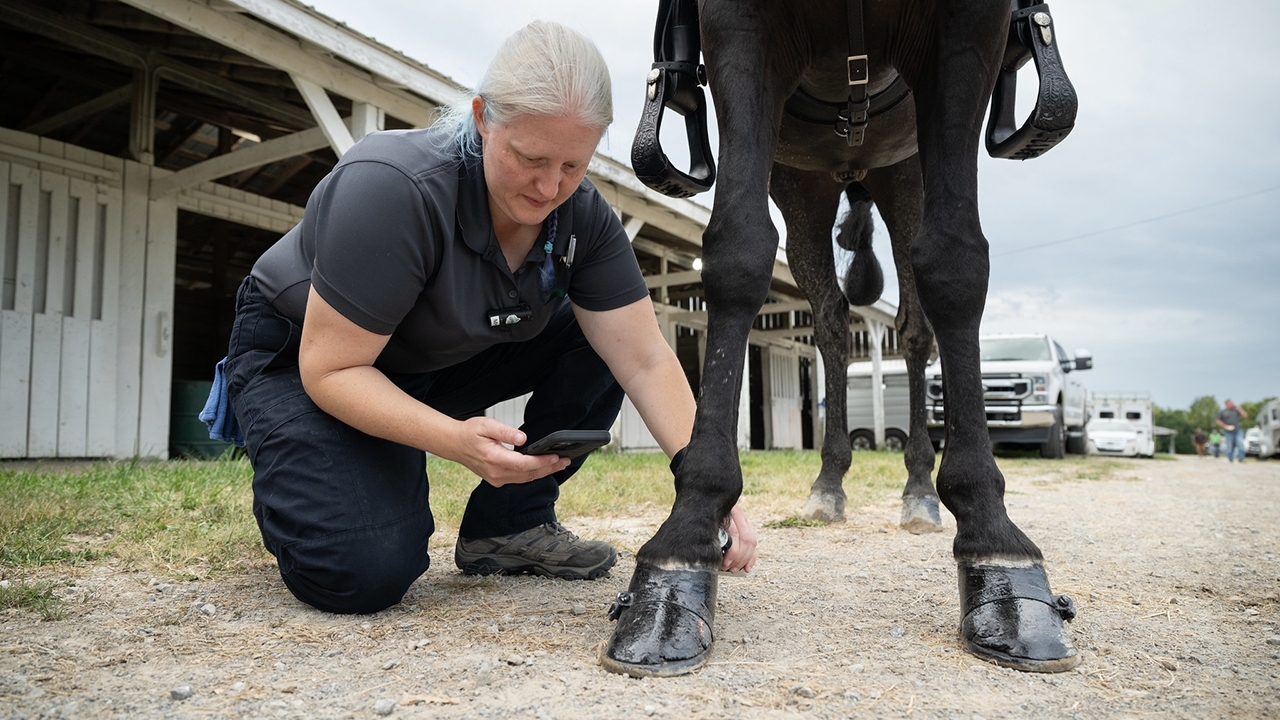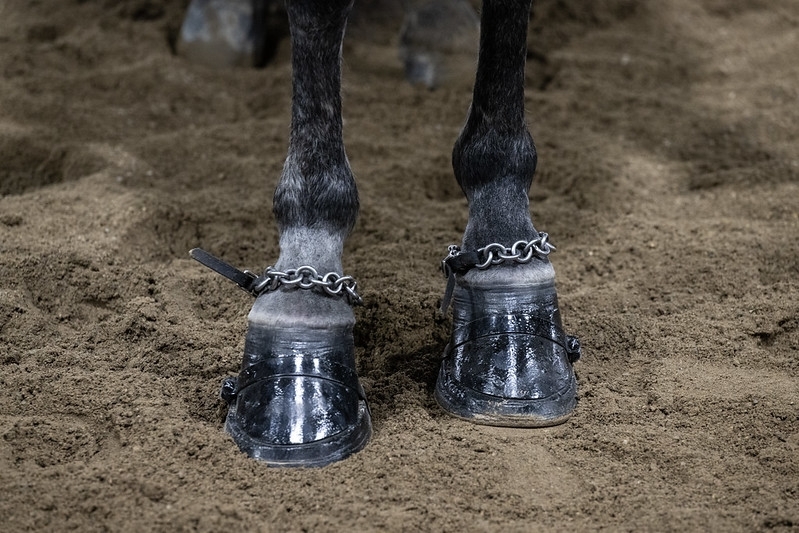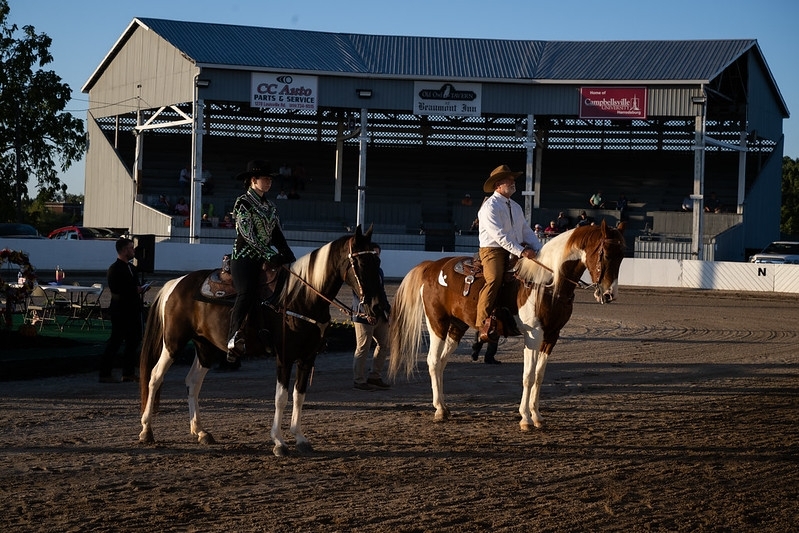Horse Protection Act

The Horse Protection Act (HPA) is a Federal law that prohibits sored horses from participating in shows, exhibitions, sales or auctions. It also prohibits the transportation of sored horses to or from any of these events.
Soring is a cruel and inhumane practice used to accentuate a horse’s gait. Soring can be accomplished through the use of certain substances, devices, and/or practices that when applied to a horse’s limb can cause physical pain, distress, inflammation, or lameness when walking, trotting, or otherwise moving. A horse that has been sored will pick up its feet higher and faster, creating a highly animated gait that is desired in specific breed classes, such as those of Tennessee Walking Horses and racking horses.
About the Horse Protection Act
The Horse Protection Act is administered by APHIS. Since amended in 1976 to allow for third-party inspectors, the Act has been enforced by both APHIS Veterinary Medical Officers (VMOs) and Designated Qualified Persons (DQPs). Under current regulations, a DQP must meet regulatory requirements and be licensed by a Horse Industry Organization (HIO) certified by the Department.
Over the decades, APHIS has provided oversight to certified HIOs and licensed DQPs to help ensure the effective identification of sored horses. APHIS officials also attend and monitor HPA-covered events that are not affiliated with an HIO.
In May 2024, APHIS published new Horse Protection regulations that eliminate the role of DQPs as well as the regulatory responsibilities of HIOs. In March 2025, APHIS issued a postponement of the effective date of the final rule, with the exception of § 11.19, to February 1, 2026. Effective February 1, 2026, only APHIS VMOs and Horse Protection Inspectors (HPIs) may conduct inspections in accordance with the Horse Protection Act and its new regulations. Once trained and authorized by APHIS, HPIs will function as third-party inspectors who are available for event managers to appoint to conduct inspections at their events (for more information, see “Horse Protection Inspectors" section below). Alternatively, as of February 1, 2026, event managers may opt to request an APHIS VMO to conduct inspections at their event. Event managers are not required to appoint an HPI or request an APHIS VMO but doing so limits their liability if a horse is found to have been shown, exhibited, sold, or auctioned while sore.
VMOs may use additional diagnostic technology during their examinations to obtain objective and scientific data to help identify sore horses.
APHIS may bring administrative or criminal complaints against alleged violators of the HPA. Administrative complaints may result in civil penalties of not more than $2,000 for each violation, and an order disqualifying the violator from showing or exhibiting horses or otherwise participating in any horse event except as a spectator. Periods of disqualification are determined on a case-by-case basis but must be no less than 1 year for the first violation and no less than 5 years for any subsequent violations. Civil penalties of up to $3,000 can be assessed for a violation of an order of disqualification. The Act also authorizes the Secretary of Agriculture to provide for the settlement of cases.
The Federal Civil Penalties Inflation Adjustment Act Improvements Act of 2015 (Sec. 701 of Pub. L. 114-74) requires agencies to adjust their civil monetary penalties for inflation annually. These adjustments are reflected in 7 C.F.R. 3.91(b)(2)(viii) and (ix) and serve to maintain the deterrent effect of civil penalties.
Criminal proceedings may be initiated against individuals who knowingly violate the Act. Criminal penalties include fines of up to $3,000 and 1 year in prison for a first offense. Each subsequent violation may result in fines of up to $5,000 and imprisonment for up to 2 years.
A Designated Qualified Person (DQP) is a person who, until January 31, 2026, may be appointed and delegated authority by the management of any horse show, exhibition, sale, or auction, to detect or diagnose horses which are sore or to otherwise inspect horses and records to enforce the HPA.
The USDA does not license DQPs on an individual basis. Licensing of DQPs has been accomplished through certified DQP programs maintained by Horse Industry Organizations (HIOs). An HIO is an organized group of people engaged in the promotion of horses through, among other things, the showing, exhibiting, sale, auction, or registration of horses. An HIO must have applied to the USDA to certify its DQP Program and USDA has not certified and will de-certify any DQP Program that is not in compliance with HPA regulations. However, as of February 1, 2026, HIOs are relieved of all regulatory requirements, negating the need for certification, licensing of DQPs, and previously ascribed record-keeping requirements.
Licensed DQPs, while still in effect, receive inspection assignments to various shows, exhibitions, sales, and auctions through certified HIOs. While affiliation with a certified HIO and the use of licensed DQPs is not mandatory, most Tennessee Walking Horse and racking horse event managers choose to use DQPs to reduce their liability under the Act if a horse is shown, exhibited, auctioned, or sold while sore. When the management of a horse show, exhibition, sale, or auction does not affiliate with a certified HIO to secure inspections by a licensed DQP, event management and other responsible individuals are held accountable for any violations of the HPA that occur at the event.
While DQPs and HIOs are no longer part of the regulations that take effect on February 1, 2026, event management will still have the option of requesting an APHIS VMO or HPI to inspect horses to reduce their liability under the HPA if a horse is found to have been shown, exhibited, auctioned, or sold while sore.
The Horse Protection Inspector training program is currently paused as we reevaluate the training curriculum. Horse Protection Inspectors, or HPIs, are third-party inspectors who are screened, trained, and authorized by APHIS to perform inspections under the Horse Protection Act, replacing the current DQP inspectors. While HPIs may not conduct inspections until February 1, 2026, the new Horse Protection rule allows APHIS to begin the HPI application process as of June 7, 2024, so that training and authorization of HPIs can occur prior to February 1, 2026. HPIs are required to be either veterinarians, veterinary technicians, or State or local animal welfare officers and all must have prior equine knowledge and experience. APHIS will post updated application and training information once available.
In March 2025, APHIS issued a postponement of the effective date of the final rule, with the exception of § 11.19, to February 1, 2026. When the new Horse Protection Final Rule becomes effective on February 1, 2026, event managers of all horse shows, horse exhibitions, horse sales, and horse auctions will need to notify APHIS at least 30 days in advance of their event, either by mail (see mailing address below) or emailing horseprotection@usda.gov. The notification must include whether event management has appointed an HPI to conduct inspections, is requesting an APHIS VMO to conduct inspections, or if event management is opting for neither (while appointing an HPI or requesting an APHIS VMO is not required, event management will be liable for any horse that was shown, exhibited, auctioned, or sold while sore).
For any events that have Tennessee Walking Horses or racking horses, there is additional information that needs to be submitted to APHIS within 5 days following the conclusion of any horse show, exhibition, sale, or auction.
For any event which does not include Tennessee Walking Horses or racking horses, event management will need to submit information regarding any case where a horse was prohibited by management from being shown, exhibited, sold or auctioned because it was found to be sore or otherwise in violation of the Act or regulations.
Horse Protection Program Show Activity Reports
Horse Protection Program Annual Activity Reports
File an Animal Welfare Complaint
To file a complaint regarding soring, use our online form.
Contact Us
APHIS Horse Protection
Email: horseprotection@usda.gov
Phone: 970-494-7478
2150 Centre Ave.
Bldg. B, Mailstop 3W11
Fort Collins, CO 80526



